
Life is different now in so many ways. The coronavirus and the attempts to stop its spread have meant a reordering of our daily existence. Concerns about loved ones, especially those we believe are most vulnerable to the disease’s effects, dominate our quiet moments. Many of us work from home while trying to play substitute teacher. Others watch their livelihoods vanish, and wonder how the rent or the mortgage will get paid. Some of us are on the front lines of this battle, medical professionals in the thick of the fighting every day. This is a time when health-care workers are called on to become warriors. And in the midst of it, many of our neighbors are also putting themselves at risk. Here are a few of the stories of essential workers who keep life going for the masses of Michiganders staying home.
Niketa Taylor | Certified nursing assistant
As a certified nursing assistant, Niketa Taylor helps a resident of a senior living community with tasks that the woman can’t carry out on her own.
Taylor, who works for Visiting Angels in Detroit, prepares meals for her client, cleans and helps the woman bathe and get dressed.
These days, she does it all wearing a mask.
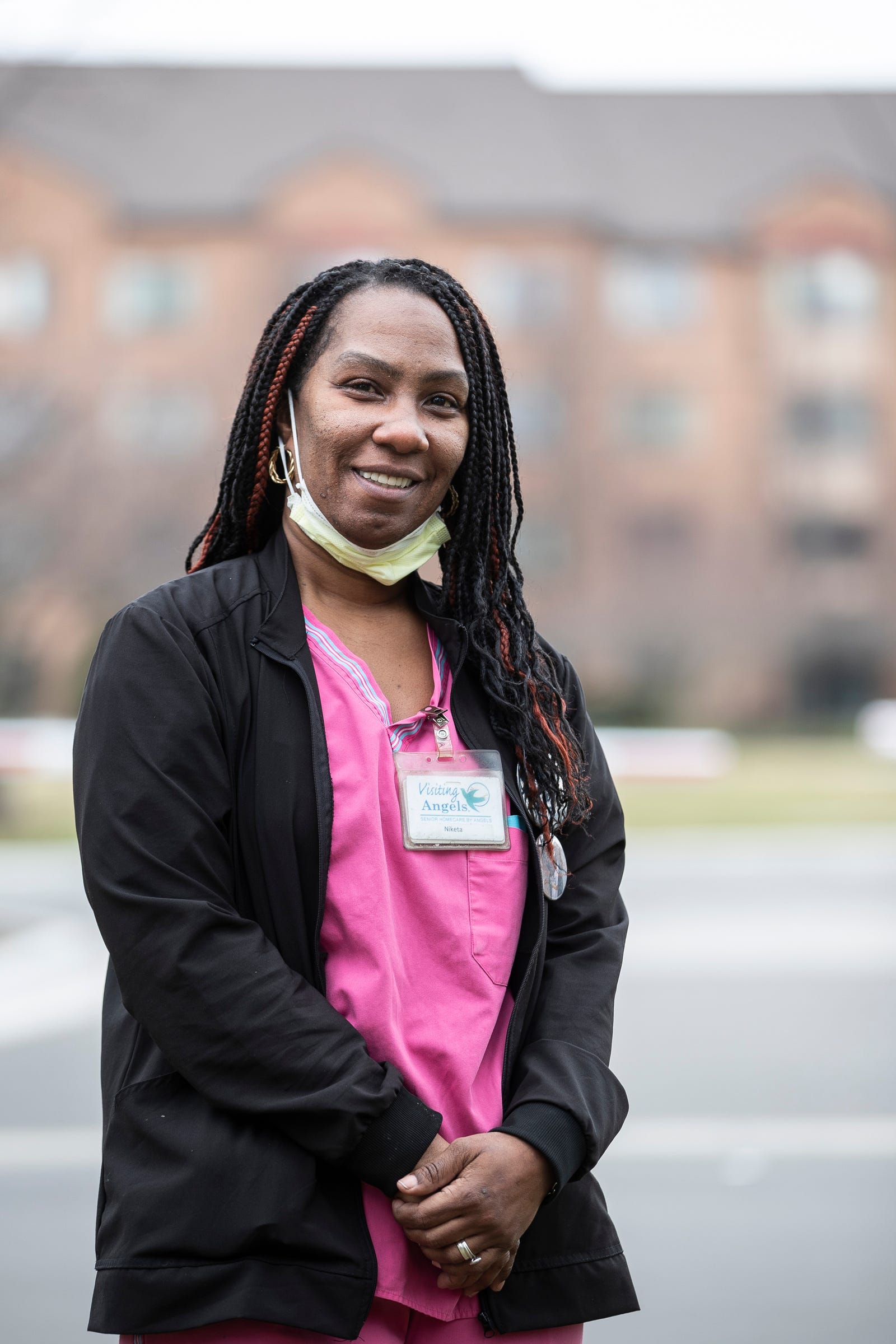
The possibility of contracting the coronavirus while at work looms large on Taylor’s mind, especially because she has two sons and a husband at home.
Taylor, 40, has encountered myriad infections and diseases in her 17 years as a CNA. Fear hasn’t stopped her from doing her job.
“She needs me,” Taylor said of her client, a woman in her 80s who lives alone. “That’s what I do. I take care of people. If I just decided to stop working, then what kind of person am I? What kind of aide would I be?”
To try to cut down on her chances of catching and spreading COVID-19, Taylor wears gloves at work, washes her hands often and stores her work shoes in the trunk of her car. She bags her dirty uniform as soon as she gets home.
Her husband and eldest son work as well, but her 12-year-old son doesn't leave their home in Detroit. Taylor stays 6 feet away from him just to play it safe.
“I can’t sit close to him. I can’t hug him. It’s hard. But he knows the field that I work in,” she said.
Taylor's family has grown accustomed to her frequent reminders to sing "Happy Birthday" when washing their hands. She has outfitted her boys with tiny bottles of hand sanitizer that clip onto their belt buckles. When her husband's at work at a grocery store deli, she texts him at least once an hour: “Make sure you wash your hands.”
Taylor says health care workers like herself put themselves and their families at risk to take care of others. The way she sees it, it's a blessing to be an example for her kids right now — to show them she’s a fighter.
That reminder helps keep her stress at bay. That, and long, hot baths after her shifts.
Channing Smith | Office supply store worker
Channing Smith never thought of his retail job as an essential business until recently.
On Monday, when Gov. Gretchen Whitmer issued a stay-at-home order, customers flooded the office supply shop where he works. The Sterling Heights man said it was easily one of the busiest days he’s seen, and he’s been through a few back-to-school and Black Friday rushes.

“People were coming in in droves,” said Smith, 58. “I didn’t think of us as essential, but that work-at-home order … we sell the things that allow people to do that.”
Smith’s employer asked that he not identify the store.
He has worked there two years as of December. It’s a post-retirement job for the former radio journalist who spent 35 years working in Tennessee before moving to metro Detroit with his wife a few years ago. He wanted something that would get him out of the house.
Smith and his wife, Karen, the lead ethicist at Henry Ford Health System, recently celebrated their 12th anniversary, and given how dramatically life has changed in that time, he said he wished they had gotten dinner out then.
Smith and his co-workers do a range of jobs at the store — stocking, working the cash register, even sales.
Life at the office store was busy all week, although not as much as the day of the announcement. Many people appear to be heeding advice to stay home unless they need to be out, although Smith found himself wondering about a few incidents at his store and elsewhere. In one case, an older man came to the store looking for hardware to hang pictures, which is something the store doesn't carry.
“Is there nobody to tell them that that’s not a good idea (going to the store for non-essential trips)? You don’t want to be confrontational at this point in time, but it kind of makes you wonder a little bit,” said Smith, whose voice carries the rich depth you’d expect from someone who spent so many years with a microphone.
Smith’s store added curbside pickup as part of its response to the virus. Customers place an order online and pick up their purchases when they arrive. He thinks it might be an option that continues after the initial virus worries have subsided.
Smith and his co-workers have access to gloves and hand sanitizer, although there’s no mandate to use them. He said he sometimes uses gloves, particularly when he’s handling money, and he has started seeing some customers wearing masks.
“People that are working right now, you’re taking the precautions that you’re told to take. But is that really enough? I consider it a little bit of a risk, but I don’t feel that it’s unsafe,” he said of his work.
Jerrell Simmons | Carpet cleaner
When Jerrell Simmons enters an office with his carpet-cleaning machine, he has no idea whether the coronavirus might be lingering on surfaces he’ll encounter.
Simmons, 27, cleans carpets in commercial buildings as an independent contractor with Detroit Maid. He also cleans homes and runs a car-detailing business in Detroit.
His hours have dwindled, falling from 25 hours a week to 10-15 since the COVID-19 pandemic reached Michigan.
To Simmons, his work is more essential now than ever.
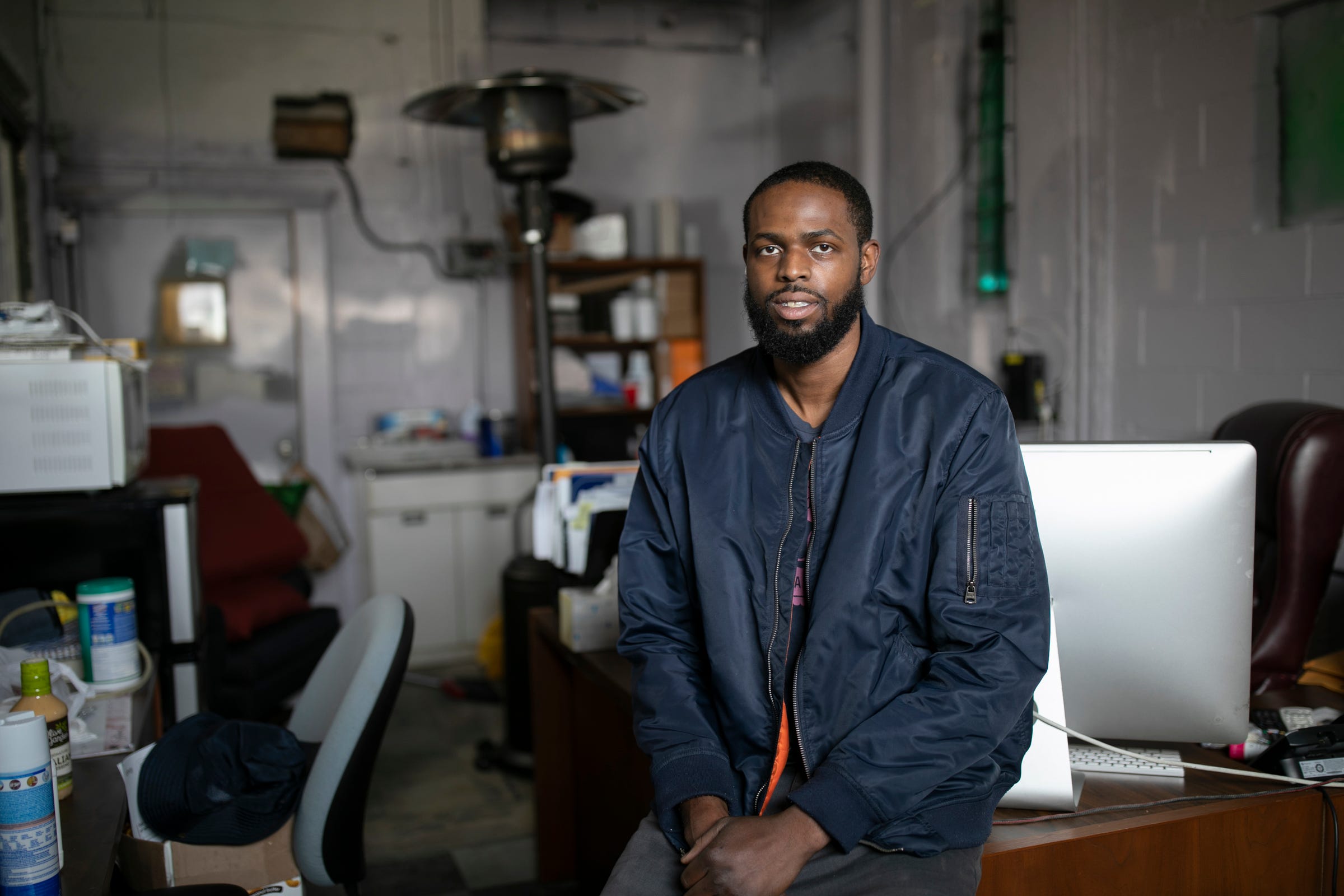
When this is all over, when Gov. Gretchen Whitmer’s stay-home order lifts and metro Detroiters return to some semblance of normalcy, Simmons hopes people will prioritize cleanliness.
“People don’t realize on a day-to-day basis we touch so many surfaces,” he said.
His work, disinfecting public spaces while Michigan’s nonessential workers stay home, can feel anonymous.
“People will sit here and see it clean. They won’t even think much about that. But when I come here and do my job, that’s what I think of,” he said by phone on a recent morning from a Social Security Administration office as his carpet-cleaning machine whirred in the background.
“I’m not just doing it for just me. I’m doing it for the next man. They might not appreciate it, but I can potentially save someone’s life just by cleaning.”
Jennifer Rod | Health-care director and Shipt shopper
By day, Jennifer Rod works at the Heartland Healthcare Center in Allen Park, where she's the director of rehabilitation. In her role, she oversees physical, occupational and speech therapies.
But recently, she began looking for ways to earn and save some extra money. Rod's 2-year-old daughter, Emma, was born with a cleft lip and palate. She has had surgeries since she was 6 months old.
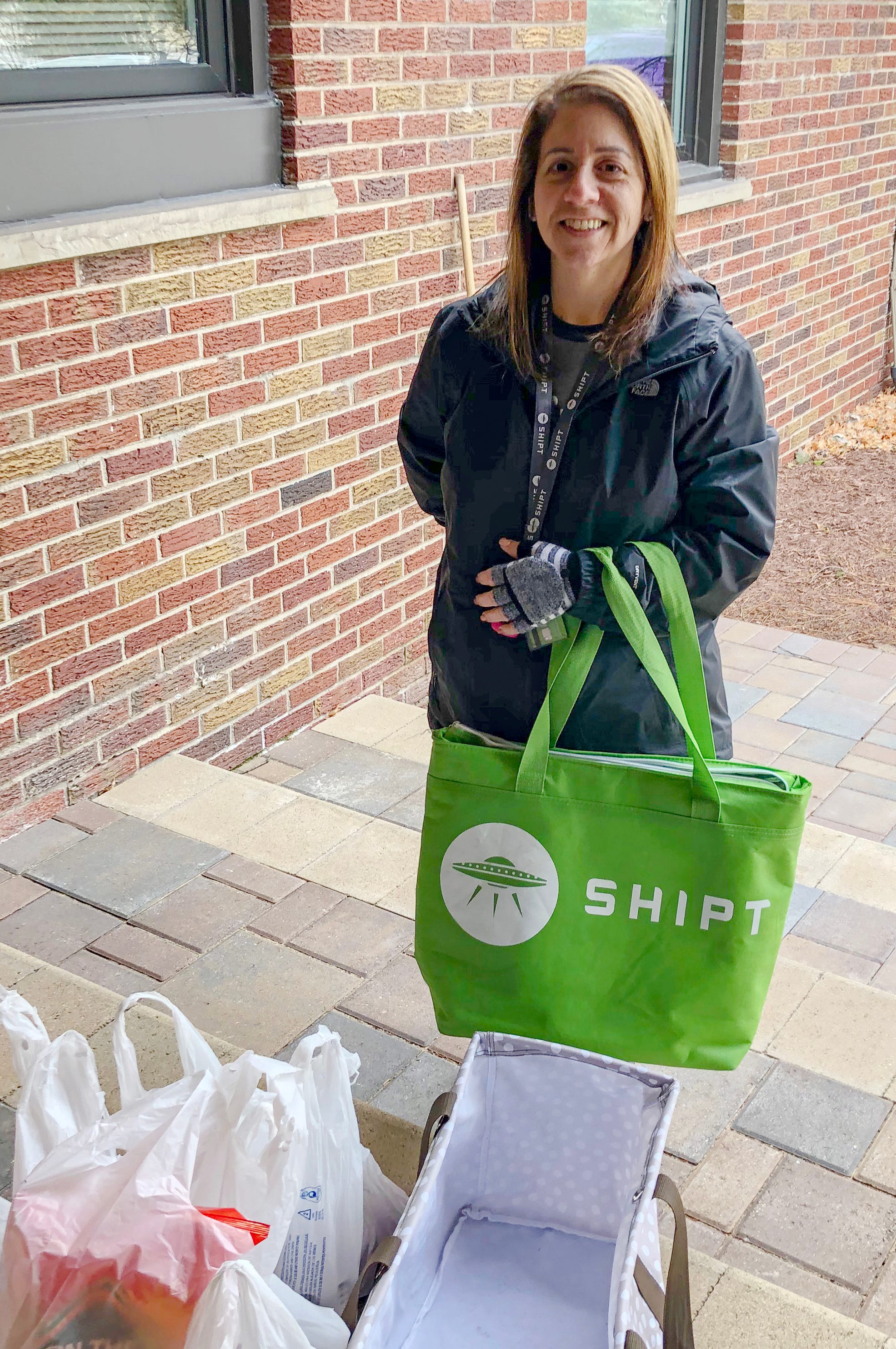
"Health care is expensive, and we are using the extra to pay other expenses," Rod said.
And so, in late February, Rod became a Shipt shopper.
"I thought it would be a good fit for me as a second job," she said. "I like to shop, and it was something I could do."
But being a Shipt shopper during this coronavirus climate can be a good and bad thing. Shipt is busy. Very busy, Rod said.
During Rod's first month, she earned around $2,100, which included tips from clients left to her through the service.
"When I started in February, I had a lot of older clients," she said. "Now it's a variety of ages.”
During this coronavirus outbreak, Rod is cautious in both jobs. At the Heartland Health Center, she is following all the government recommendations and social-distancing rules.
When she comes home from her day job, she takes a shower, changes clothing, gets dressed and goes back out. She repeats the same routine when she gets home from Shipt shopping.
For Shipt this week, she didn't take many extra jobs, though there were plenty, and she felt bad not being able to do so.
"I have small children at home and I want to be careful, too," she said. "I use precautions. I've been wearing gloves, doing proper hand washing and hand sanitizing and not touching my face.
"I want to help other people get their groceries, but I also have to have a balance,” she said.
But she’s also good at shopping.
“I am pretty organized,” she said. “I did four orders at the same time and made sure I double- and tripled-checked, making sure I had it right.”
She communicates with clients via text and lets them know when she’s starting their order. She lets clients know when a store is out of an item and will look for a substitute or even take picture of items.
“I try to be flexible. I think people are appreciative of what I can or cannot find and what’s available,” Rod said.
Calvin Taylor | Cleaning up Detroit's illegal dumps
The pieces of shingle and roofing debris piled on a west-side Detroit street mean the days must be getting warmer.
Once winter recedes, unscrupulous roofers who don’t want to pay to take their trash to the dump will find a spot like this one on a street near an abandoned house. It's not just shady roofers who do this, of course, but their work depends more than that of other illegal dumpers on the weather outside, according to Calvin Taylor, who has to clean it up.
Taylor has seen this many times before, and he’ll use a log loader with a 10-yard bed to haul this batch away. He’ll guide a large black metal arm toward the street and back to the truck, grasping a claw full of trash each time. Then he takes a rake and scrapes up what else he can.
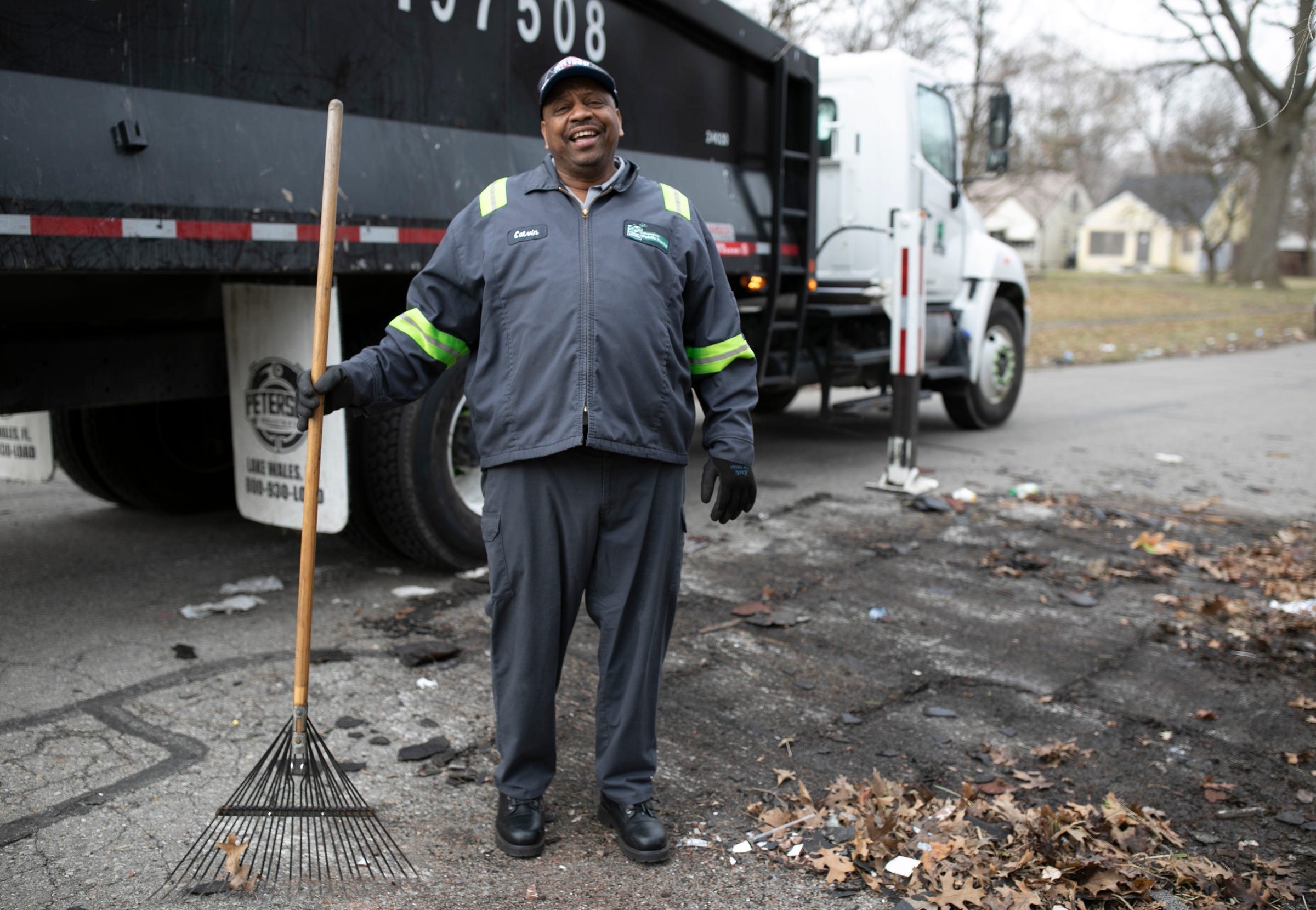
“My job depends on people not doing right,” said Taylor, 58, who has done this kind of work, cleaning up illegal dumps for the City of Detroit, for six years. In May, it will be 31 years working for the city. He has done other kinds of refuse collection for the city over the years and still drives a salt truck in the winter when needed.
“I can’t clean up the whole city, but I do what I can,” he said.
Thursday was Taylor’s first day back on the job since many city workers were sent home earlier this month to wait out the coronavirus outbreak. He'll work periodically to make sure this type of cleanup work doesn’t stop all together.
Taylor’s job is viewed as a critical city function. It's a message emphasized by the sign attached to the passenger-side window of his truck reading “essential critical infrastructure worker.”
Illegal dumps aren’t just unsightly; they’re also a health and safety hazard. Rats (rabbits, too) will find a home in them if the mess isn’t cleaned up.
Residents notice Taylor's work. A man, with a face mask pulled down so he could talk slowed while driving past to let Taylor know he was thrilled the pile on Wadsworth just west of Evergreen was about to get cleared.
Things on the job haven’t changed much for Taylor since the virus erupted, although he now adds a pair of thin blue gloves to his work attire, which includes a Detroit Pistons cap. He’d use thick work gloves in the past when needed, but now he has the other pair for other parts of the job, much of which involves not just cleaning up but also hauling it off to a dump.
On a normal day at the city yard on Russell Street, Taylor said he’ll see more than 100 people working. On Thursday, there were 12.
His wife, who also works for the city on employee benefits, is OK that he’s out working, Taylor said, because she knows he's alone when he's out with his truck.
During the days he was home, he caught up on some TV shows he hadn’t seen and saw his grandkids. He normally keeps some extra household items on hand, but didn’t rush out to the store like so many others when the stay-at-home order came.
“I’m not going to be in a store aisle fighting over toilet paper,” he said.
Dominque Collins | Cook for the needy
“We will cook and not cower to COVID-19,” read the handwritten sign hanging in the kitchen Wednesday at the Horatio Williams Foundation building near Lafayette Park.
A group of chefs led by Max Hardy, Genevieve Vang, Phil Jones and publicist David Rudolph were busy cooking 225 meals for some of Detroit’s neediest and most vulnerable citizens, the homeless families and individuals serviced by COTS (Coalition On Temporary Shelter) and the Neighborhood Service Organization (NSO) Tumaini Center.
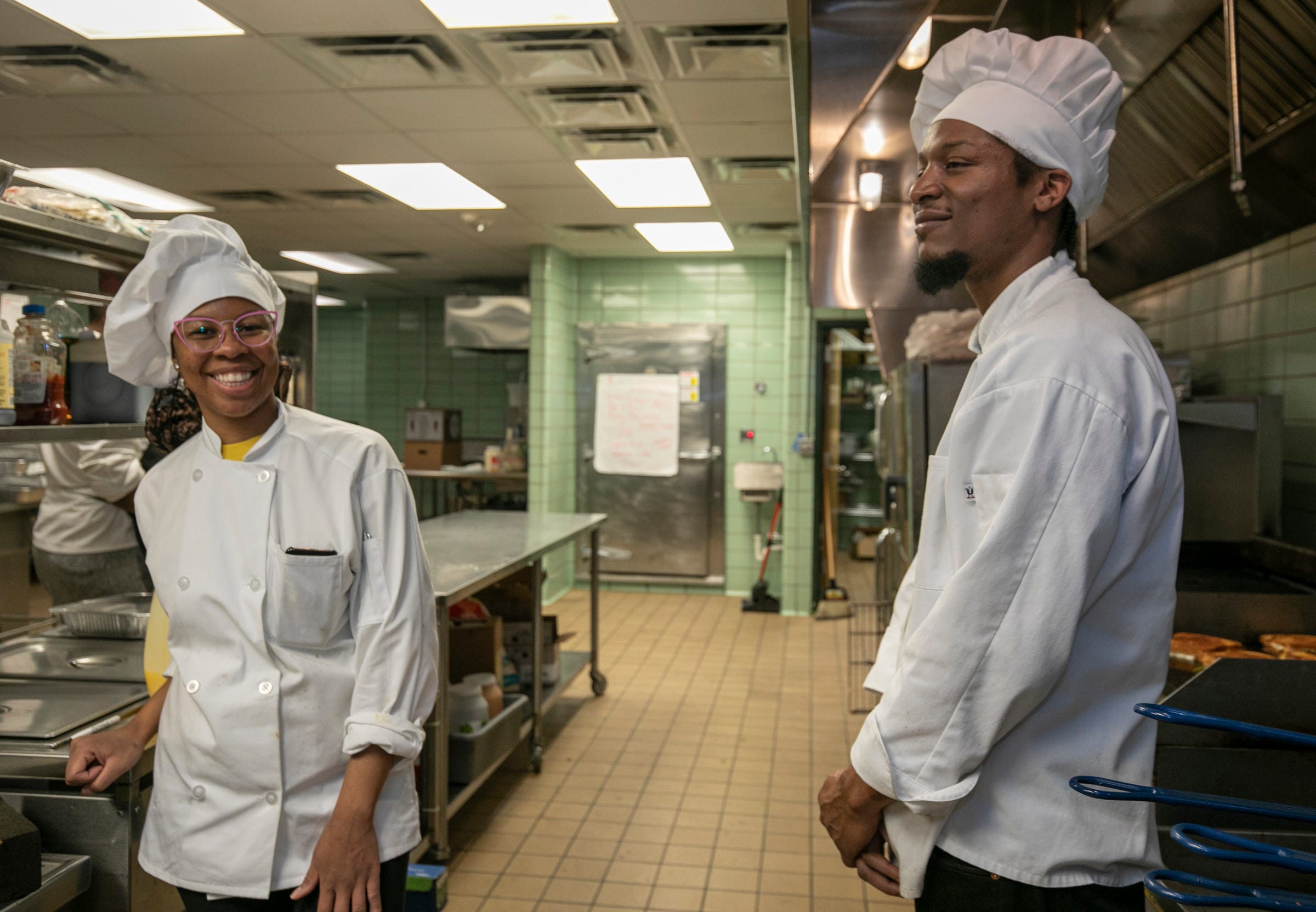
It wasn’t a typical culinary training situation, but nothing had been typical since the spread of COVID-19.
So here, too, was Dominque Collins. Laid off from her job as a compliance coordinator since January, Collins had finally doubled down on her longtime passion for cooking by enrolling in Focus: HOPE’s five-week culinary pre-apprenticeship program.
“I’m using this as a fresh start to actually do what I love,” the 29-year-old Troy resident said. “I’ve always loved to cook. I’m a big foodie. … Cooking food for people — to see people’s reactions when they like your food, it’s amazing.”
But halfway into the program, the new coronavirus hit. The class was put on pause. But the learning continues with what’s now a more essential mission than ever.
“You want to make sure in a time of crisis that people still have meals to eat and that they have the proper nutrients that they need,” Collins said matter-of-factly when asked why she continued to volunteer her time handling food instead of self-isolating.
“I think it’s a blessing that we’re able to do this service and we haven’t been stopped,” she continued. “I was afraid that we weren’t even going to be able to continue. But to see the food coming in every day — people finding food and donating things from their restaurants and restaurants donating food — it’s really a beautiful thing.”
They cooked pineapple steak tacos last week. Today was panzanella salad. There’s been herbed and roasted chicken. And tomorrow they’re preparing grilled cheese and tomato soup — comfort food in this time of need, for folks who need it most.
“I like to see our community come together,” Collins said. “Because a lot of people think coronavirus and everything going on with the stock market is going to increase the crime rate, but I’m proud to be a part of a platform where we can come together as a community. That’s what this is all about.”
Lt. Erik Chesnut | Paramedic
They have more training, more equipment, more high-tech than almost anyone for holding at bay the pandemic's contagion.
Still, they’re more exposed than almost anyone.
Paramedic Lt. Erik Chesnut and his team of med techs at the Southfield Fire Department are literally in contact with the deadly virus every day, assisting people who are highly contagious yet desperate for transport to a hospital.
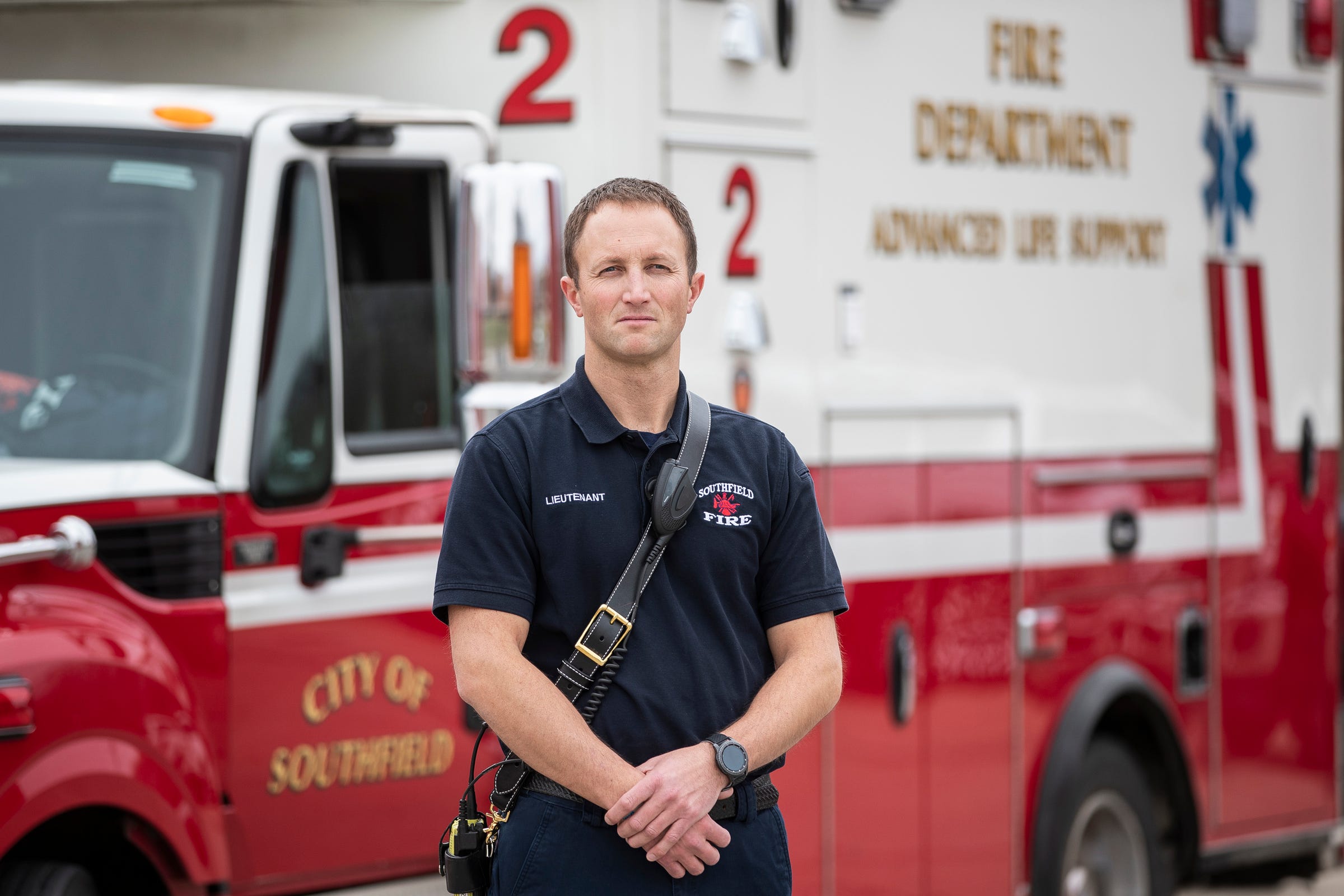
Since the crisis exploded, “our run volume has gone through the roof,” Chesnut said after meeting briefly with Southfield Fire Chief Johnny Menifee and Mayor Kenson Siver Thursday in a parking lot, each standing several paces apart. They discussed how the mayor’s digital newsletter could do more to assure residents “that everyone is doing everything we can — that people haven’t stopped working,” Siver said.
He shot a photo of Chesnut, then drove off as the lieutenant spoke with a reporter, standing 6 feet away, about how he weighs the health risks of his job with the unquestionable need to do it. Chesnut said he was speaking for all EMS techs in Southfield — Oakland County’s busiest fire department and the sixth-busiest in Michigan, according to a recent ranking in total runs per year. He could well have been speaking for med techs across the country. All are risking their health on every run.
“We’re all wearing gloves and respirators and safety glasses. But we have to be hands-on with people calling with coughs and shortness of breath. So we’re hands-on with this virus. We’d be lying if we said we aren’t nervous,” Chesnut said.
“I have a wife and three young girls — 5, 3 and 1. Everybody’s definitely scared about bringing this home to their loved ones,” he said. After each run, EMTs spray the inside of their red emergency truck with a solution of water and disinfectant. Then they place an ultra-violet light bar so that its light adds further germ-killing action for 20 minutes.
At the end of a shift, Chesnut puts all of his work clothes through the station’s laundry.
“And then I take a shower. And when I get home, I take another shower,” he said with a wry smile.
Just then, the station’s squawk box blared an alert, including the words “they're reporting shortness of breath and coughing.” Chesnut nodded, as med techs behind him dashed into the station to grab gear before heading out — on their truck, not his.
“That’s the nursing home just up the street. We go there all the time,” he said.
“We transport to hospitals and we talk to the nurses and all the heath-care people, and we’re all nervous about what this could do to our loved ones, friends and family.
Several of his colleagues are off the job, in quarantine, because they were exposed “before we knew what this was,” Chesnut said. He’s hopeful that all will recover.
“I think everybody was surprised how brutal this came on.”
Tommie Felton | Food pantry supervisor
For 26 years, Tommie Felton has come to work at a Focus: HOPE food pantry on Detroit’s east side.
Felton drives from his home in Redford Township to a tan-painted brick building just north of I-94 at the base of one of Michigan’s poorest zip codes.
He supervises five workers and all are following strict new health rules. Still, while most Michiganders stay safe at home, they come to work every day to provide an essential service: giving boxes of food to seniors.
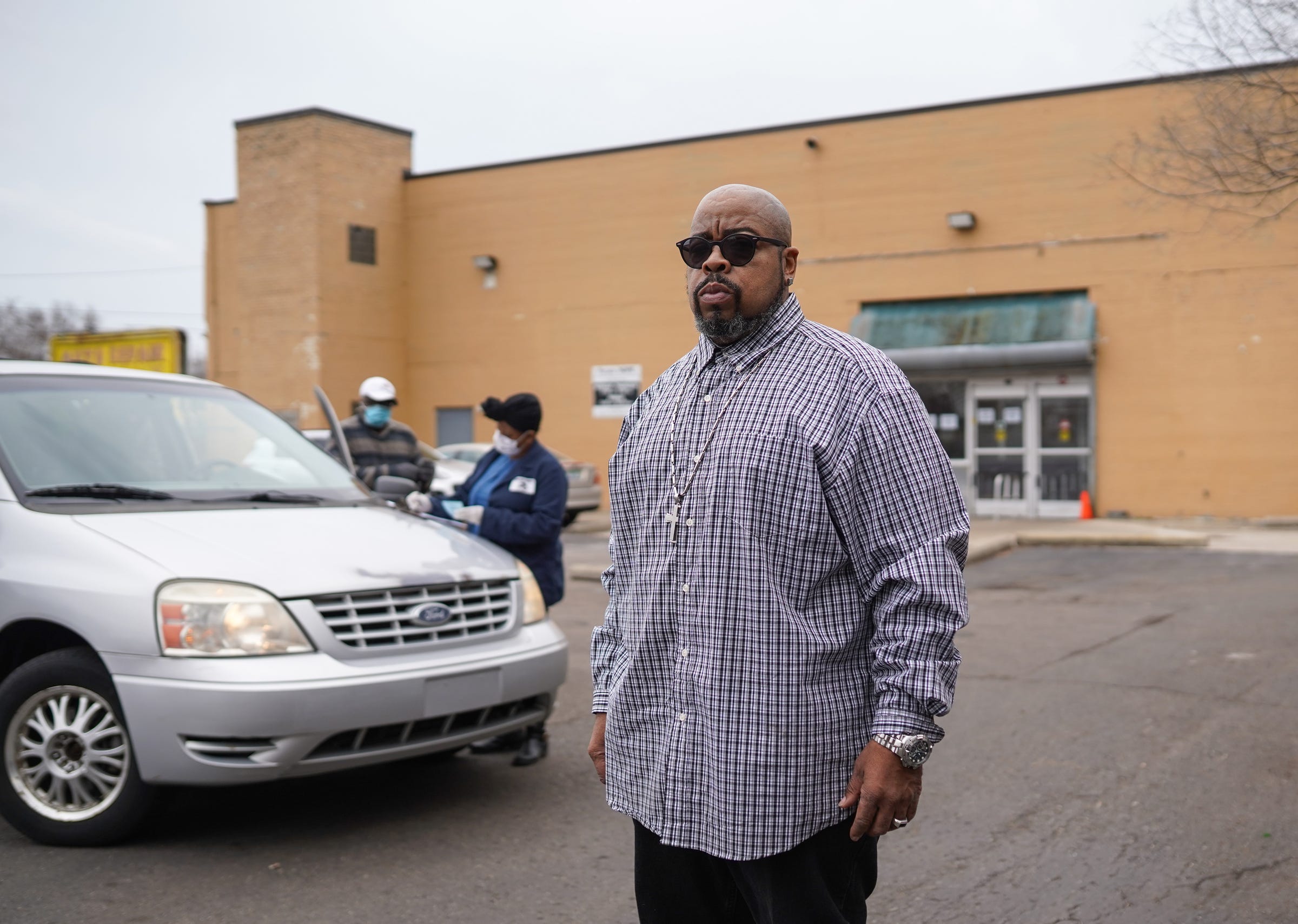
“People have to eat,” Felton said, standing in the parking lot 6 feet from a reporter, as one of his workers placed cardboard boxes in the back seat, while the driver stayed behind the wheel.
“We’ve switched to drive-through. Nobody gets out of their car. Nobody comes inside anymore. We bring it to you,” Felton said. His crew loads as many as 70 cars a day, hefting boxes jammed with basic foodstuffs.
“We give 'em juice, we give 'em fruit, we give 'em vegetables, rice, cheese, milk. ... Oh yeah, bread, spaghetti," he said.
At home, his wife, son and grandson tell him to stay safe as he leaves each day.
“I had to explain to them exactly the importance of what we do. Regardless of this virus, people still have to eat. It’s been overwhelming — the response we’re getting — with so many other places closed,” he said.
After the governor’s order to shelter in place, Felton said he told his employees to do just that if anyone gets sick. None has.
“So far, everybody’s been faithful about coming in,” he said. Clad Thursday in a pewter cross strung on a necklace and black cowboy boots, Felton also wears a mask much of the time that he’s inside his building, he said.
“We’re here 8 to 4 Monday to Friday, but on Fridays, we close to the public at noon. That gives us time to make up the boxes” from pallets of staples delivered by truck from Focus: HOPE’s main campus, 11 miles west at 1400 Oakman.
Each day, when Felton leaves the house, he said he hears from his family what's become the universal farewell of the COVID-19 crisis, a phrase still too new and freighted to be a cliché: “Stay safe.”
Felton said he’s trying — for himself, for his team and for an urban village of hungry seniors.
Andy Seltz | Vice president, field services Michigan Humane Society
The number of calls to the Michigan Humane Society has dropped, but the reasons for many of those calls have evolved a bit since the governor’s stay-at-home order on Monday.
And it’s not a positive development.
“We’re seeing a lot of calls for request for assistance for pet food. We’ve had a lot of citizens indicating really in distress that they’re out of pet food” and they have no transportation, said Andy Seltz, 43, the group’s vice president of field services.

In some cases, people are being quarantined and they cannot provide for their animals. So staff have been making pet food deliveries to help out.
Seltz, who oversees cruelty investigations and rescue along with other key roles at the Michigan Humane Society in Detroit, said he does not believe the change in call volume has anything to do with a drop in cruelty cases. People are simply focused elsewhere, eyes glued to TV sets or checking on family as southeast Michigan’s COVID-19 case numbers explode.
By Thursday afternoon, only 33 calls had come in for the day. Compare that to a so-called normal day when that number could be as high as 600, Seltz said.
“You see a lot less eyes on the streets, a lot less reports,” Seltz said, noting that he expects those numbers to rebound significantly.
One reason is that virus sufferers might end up in the hospital, and if there’s a quick departure from the home, any animals left behind will need help. Those who can’t travel to a veterinarian will also need assistance if their pets require medical care.
Seltz said the Michigan Humane Society staff had been watching the progression of the virus before it became a problem here and tried to plan accordingly. The reduction in calls had been expected as well. Daily staffing, which includes investigators, rescue agents and coordinators, was lowered to make sure people would be available even if the virus forced some staffers to take a break.
“At this point, it’s strictly voluntary for the staff that’s out there right now,” Seltz said, noting that staff members must watch out for their families first and that he’s on the rotation and expects to “plug in” to one of the roles when needed. He's currently working remotely. “I’ve worked in the field for 15 years now. Stepping back into any of those roles isn’t going to be an issue now.”
In part because its staff deals with hoarding cases, the Michigan Humane Society already has protective equipment on hand, such as masks with canisters, gowns, gloves, booties and hand sanitizer. But Seltz said staff members have to consider how they interact with people in ways they haven’t had to before in order to avoid exposing themselves unnecessarily (such as letting someone keep their pen after having them sign a form).
Still, Seltz, who lives in Commerce Township, said recent days have shown him a community with more cohesiveness and people willing to help one another.
Some of those who call for help from the Michigan Humane Society think there’s not a solution to their problems. More are calling in tears, and they’re appreciative that someone will come out and help them.
“It’s always been that way, but it’s heightened now,” he said.
Dominic Hamden | Milan mayor
In the city of Milan, Mayor Dominic Hamden is adjusting to working from home — using his home office, getting housework done and using his time to paint, clean out his basement and even plant flowerbeds.
The 41-year-old husband, father and attorney has lived in Milan, located in Monroe and Washtenaw counties, for 15 years with his wife, Laura, and their two sons, Ethan, 15, and Alexander, 12.

He was elected in November 2017 and is going on his third year of overseeing a community of approximately 6,500 people.
Milan’s “feeling of community” is what attracted Hamden to the city and it's what he hopes to encourage during a time of confusion and fear because of the novel coronavirus outbreak.
To help people stay connected, Hamden started Milan Moments, an initiative that encourages residents to come outside at 7 p.m. to wave to neighbors, have conversations from their driveways and stay in touch.
"This is a way for people to socialize in their own yards in their own homes with their neighbors and still comply with what the governor ordered us to do," Hamden said. "Milan Moments is just a piece of the good deeds we're seeing through the city right now. I'm exceptionally proud of how the residents in this city are handling these circumstances."
Hamden hopes that people will look back at this time and be able to say, "We did this correctly and we did it in a kind way."
Hamden had his own law practice for 10 years before being elected as mayor and was on the city council for eight years.
Contact Eric D. Lawrence: elawrence@freepress.com. Follow him on Twitter: @_ericdlawrence.